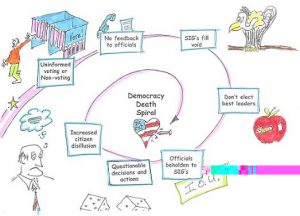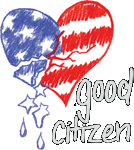Teaching Citizenship Unit
Lesson 2 – Importance of Being Involved in Our Democracy
Objective
Help students recognize that:
- they are citizens in a democracy,
- our democracy is worth keeping, and
- their active involvement in our democracy is critical for it to survive.
Topics
1 – Appreciating the U.S. Democracy
Teaching Points
- Ask kids to make a list of the nice things about the United States.
- Organize their points under categories such as:
- freedoms
- opportunities,
- conveniences and comforts,
- goods, and services
- diverse, generous, and hard-working people
- diverse land
- Discuss what each category means and add new points. Contrast what we have against other societies.KEY POINT – We are fortunate to live in the United States
Materials
Things To Appreciate About the U.S. Worksheet – Ask the kids to pick 1-3 things from the list they particularly appreciate and explain why they are important to them.
2 – Impact of Not Staying Involved
Teaching Points
If citizens don’t pay attention to their responsibilities, special interest groups will fill the void.
We make uninformed decision, we don’t elect individuals who have our interests at heart – special interest groups fill the void – they influence our elected and public officials. Elected officials don’t actin our interest, we become disillusioned and less involved and the cycle continues.
In a democracy, the citizens choose those to govern them.
Materials



